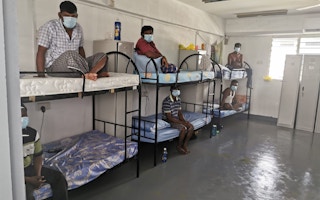Hotels and more private sector players have been deployed in Singapore’s fight to curb the spread of Covid-19 among migrant workers, as confirmed cases continue to surge.
To continue reading, subscribe to Eco‑Business.
There's something for everyone. We offer a range of subscription plans.
- Access our stories and receive our Insights Weekly newsletter with the free EB Member plan.
- Unlock unlimited access to our content and archive with EB Circle.
- Publish your content with EB Premium.
The Singapore Tourism Board said on Friday (17 April) that hotels are currently being used to house migrant workers relocated from dormitories. But it did not reveal how many workers are currently being put up at hotels, and how many hotels have been deployed.
While Singaporeans returning from abroad in the earlier days of the outbreak were put up at luxury hotels to serve their 14-day stay-home notices, migrant workers who have been moved out of crowded dormitories for safe distancing have thus far been put up at army camps, vacated public housing blocks, floating hotels used to house offshore and marine workers and other locations. Some workers have also been shifted to void decks and completed carparks of public housing projects under construction.
Singapore’s delayed implementation of safe distancing at dormitories—which house hundreds of thousands of migrant workers from countries such as Bangladesh, India and China—as well as appalling hygiene at some sites have drawn heavy criticism and made international headlines. The spike in coronavirus cases among migrant workers in Singapore has also highlighted the vulnerability of this group amid the pandemic.
As of Thursday, dormitory-linked virus cases made up 60 per cent, or 2,689 out of the total 4,427 confirmed cases in Singapore.
Revealing for the first time that hotels are now being deployed, the Singapore Tourism Board’s director of hotels and sector manpower Tan Yen Nee told Eco-Business: “Hotels are among the alternative accommodations currently used to house foreign workers.”
She added: “Hotels are assessed based on whether they meet the operational requirements to be used as temporary accommodation for foreign workers. This includes factors such as trained manpower, proper security arrangements, and infection control precautions.”
The board also announced on Friday that two cruise ships under Genting Cruise Lines may be used to house foreign workers who have recovered from Covid-19, and who have tested negative for the virus. The Superstar Gemini arrived on Friday from Hong Kong to be assessed as an accommodation site, while the Superstar Aquarius, currently in Taiwan, will be activated later if needed, said the board’s cruise director Annie Chang.
The assessment will consider factors such as the ship’s ventilation systems, security protocols and infection control measures. If deemed suitable, both mid-sized ships can house about 2,000 workers, the board said.
Neither the board nor Genting Cruise Lines—a division of Genting Hong Kong, which is linked to the Genting Group, a conglomerate with gaming and hospitality interests—would say who initiated the idea. But a Genting Cruise Lines spokesperson said due to the Covid-19 situation, SuperStar Gemini’s operations have been voluntarily suspended since 27 January and, SuperStar Aquarius’, from 9 February. Both ships did not see any coronavirus cases among guests or crew, and have been disinfected and sanitised, the spokesperson said.
The ships are designed so that fresh air from external surroundings can be filtered and supplied to cabins and public areas of the ships, without the need for recirculation, he added. Each has over 750 cabins.
Another new venue that will be used to house migrant workers without Covid-19 symptoms is the Singapore Sports Hub, the country’s largest sports facility which operates on a public-private partnership model. Sports halls will be converted into temporary accommodation for about 800 workers, it said.












